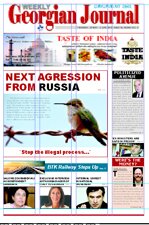Academic Light
04 April, 2013
 In the end of the formal brief meeting with the president of the Georgian Academy of Natural Sciences the other day, he presented me with one of the volumes of the reputed scientific publication called Nanotechnology Perceptions – a review of ultraprecision engineering and nanotechnology, which he happens to be an editorial board member of.
In the end of the formal brief meeting with the president of the Georgian Academy of Natural Sciences the other day, he presented me with one of the volumes of the reputed scientific publication called Nanotechnology Perceptions – a review of ultraprecision engineering and nanotechnology, which he happens to be an editorial board member of.I have to admit that I felt slightly embarrassed at the thought that Professor Kervalishvili considered me versed enough in nanotech for grabbing the book forthwith and reading into it later as voraciously as one could imagine. Let me admit courageously that the definition of nanotechnology had at that solemn moment escaped my extent of erudition but I shamelessly took it all in my stride. You know, there is always a youngish hope to catch up! First I carefully put the book back on the desk as if I did not know it was meant for me to take, but the friendly Professor made me feel quite comfortable with a benevolent expression on his face, exuding the hope that I might actually read and understand the complicated scientific paper. He insisted that I take the presented brainer home to nibble at it at my possible leisure. I did indeed! And not only! I swear I read it from cover to cover — with certain strain and sweat though — and guess what! As a result, I concluded that the academic light, emanating from that 165-page scientifically charged brochure might be the only power that can put Georgia on its right track of accelerated development into a country which is seriously taken by the rest of the world.
I have said this before on a number of occasions, and I want to reiterate that an undelayed vigorous scientific progress might very well be the only reasonable way for channeling our national intellectual resource rationally and optimally, which will very soon be translated into this nation’s tangible well-being. Academician Paata Kervalishvili is a strong believer in what we have highlighted as an Academic Light in this article, which of course will not start illuminating the country overnight. Time will be a huge factor here. Collapse of the soviet socio-economic structure has devastated the field of science for a very long time. Georgia was one of the most vulnerable casualties of that devastation although it once used to be one of the foremost nations of the world in terms of science and education. We used to have our word in science and technology, and we need our place back in the hi-tech. Georgia will not be a nation of servants and soldiers! Georgia is a place of talented intellectuals and gifted creative individuals in every possible walk of life. We need our fitting niche back to turn our talent into prosperity. We need to re-enlighten our people academically and scientifically. How many of us would know what nanotechnology is? Or how many of us will know that the term Angstrom is now obsolete and the new word Nanometer is currently in usage instead? Or what Nanometer means at all? Many of us will even ask back in indignation why on earth we should know the crap. We have lately become contemptuous of sciences. The world, the flesh and the devil seems to have overwhelmed us diabolically. The entertainment industry has carried our youth away rather than science and technology. Otherwise, every other young man or a woman in the street, if asked a question, would answer that nanotechnology is micromechanics used to develop working devices the size of a few Nanometers.
It is exactly the neo-enlightenment course that must be incumbent on the newly popping up alternative academic organizations like the Georgian Academy of Natural Sciences, which needs to continue functioning further based on western academic experience, coming up with contemporary projects both in science and liberal arts, excluding customary discrepancies and contradictions between these two directions of human knowledge. Prof. Paata Kervalishvili, in the capacity of its president, as he has put it, will not allow the reincarnation of the red tape in the Georgian academic system because the mentioned Academic Light that Georgia needs so badly will never reach us in case we do not make the best practicable choice.
That day, together with us was sitting Annie Kekelidze – the young biologist, president of Georgia’s Young Scientists Association. The discussion was tending to concentrate on the fate of scientific and technological development in Georgia. Our host Professor Kervalishvili, a keenly determined man to let Georgia make a significant breakthrough in the field made a deep insight into our national scientific potential and upcoming opportunities. Sitting with him, you cannot be a pessimist. Annie, who seemed to be overwhelmed with the prospect, is the daughter of our beloved mutual friend Tengiz Kekelidze who was a genius of a man, hungrily and impatiently oriented on progress. No longer around! What a loss! I am not surprised the Professor has developed a considerable amount of trust in the girl. ‘I want to make a star out of her’ – he noted almost in whisper. He will if he has decided to. For a nanosecond, a philosophical thought rushed through my mind: could this mutually agreeable cooperation between Batoni Paata and Annie Kekelidze carry the sign of symbolism, which might be conducive to Georgia’s better scientific and technological future? I wish I were part of their endeavor to change the world in which we are living. If all variables are in place, I might . . .





















































